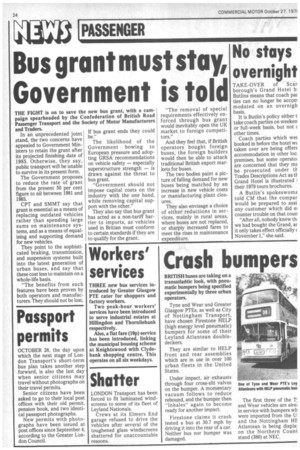2J1SZ PASSENGER
Page 26

If you've noticed an error in this article please click here to report it so we can fix it.
Bus grant must stay, Government is told
THE FIGHT is on to save the new bus grant, with a campaign spearheaded by the Confederation of British Road Passenger Transport and the Society of Motor Manufacturers and Traders.
In an unprecedented joint stand, the two concerns have appealed to Government Ministers to retain the grant after its projected finishing date of 1985. Otherwise, they say, public transport will be unable to survive in its present form.
The Government proposes to reduce the rate of grant from the present 50 per cent figure to nil between 1981 and 1985.
CPT and SMMT say that grant is essential as a means of replacing outdated vehicles rather than spending large sums on maintenance systems, and as a means of equalising and supporting demand for new vehicles.
They point to the sophisticated braking, transmission, and suspension systems built into the latest generation of urban buses, and say that these cost less to maintain on a whole-life basis.
"The benefits from such features have been proven by both operators and manufacturers. They should not be lost. If bus grant ends they could be."
The likelihood of the Government bowing to European pressure and adopting GRSA recommendations on vehicle safety — especially superstructure strength — is drawn against the threat to bus grant.
"Government should not impose capital costs on the industry with the one hand, while removing capital support with the other."
They also say that bus grant has acted as a non-tariff barrier to imports, as vehicles used in Britian must conform to certain standards if they are to qualify for the grant. "The removal of special requirements effectively enforced through bus grant would inevitably open the UK market to foreign competitors."
And they feel that, if British operators bought foreign buses, the foreign builders would then be able to attack traditional British export markets for buses.
The two bodies paint a picture of falling demand for new buses being matched by an increase in new vehicle costs or manufacturing plant closures.
They also envisage a choice of either reductions in services, mainly in rural areas, where buses are not replaced, or sharply increased fares to meet the rises in maintenance expenditure.
































































































































































